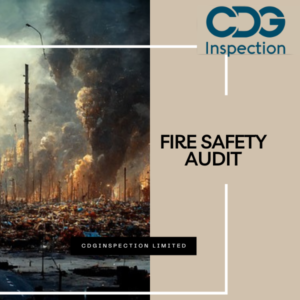Introduction:
Fire safety is a critical concern for individuals, businesses, and communities worldwide. Devastating fires can cause immense damage to property, infrastructure, and most importantly, human lives. To mitigate these risks and ensure adequate protection, expert fire safety auditing plays a vital role. In this comprehensive blog post, we will delve into the significance of expert fire safety auditing, its key components, and how it can elevate fire safety measures to new heights.
Table of Contents:
Understanding the Importance of Fire Safety Auditing:
a. The role of fire safety audits in mitigating risks b. The potential consequences of inadequate fire safety measures
The Fundamentals of Fire Safety Audits:
a. Defining fire safety audits and their objectives b. Legal requirements and standards for fire safety auditing c. Different types of fire safety audits: initial, periodic, and re-audits
Key Components of Expert Fire Safety Audits:
a. Assessing fire prevention measures and emergency preparedness b. Evaluating fire detection and alarm systems c. Inspecting fire suppression systems and equipment d. Analyzing evacuation plans and emergency exits e. Reviewing fire safety training and drills f. Identifying potential hazards and risk mitigation strategies
Selecting an Expert Fire Safety Auditor:
a. Qualifications and certifications to look for in an auditor b. Evaluating experience and track record c. Ensuring independence and impartiality d. Effective communication and collaboration with stakeholders
Conducting a Comprehensive Fire Safety Audit:
a. Preparing for the audit: gathering relevant information and documentation b. Site inspection: assessing physical fire safety measures c. Document review: evaluating policies, procedures, and records d. Interviews and observations: engaging with staff and stakeholders e. Identifying deficiencies and recommending corrective actions
Leveraging Technology in Fire Safety Auditing:
a. Utilizing advanced fire safety assessment tools and software b. The role of automation in streamlining auditing processes c. Implementing remote auditing capabilities
Implementing Recommendations from Fire Safety Audits
a. Prioritizing corrective actions based on risk assessment b. Developing and implementing a comprehensive action plan c. Monitoring progress and ensuring compliance
The Benefits of Expert Fire Safety Auditing
a. Enhanced fire safety awareness and preparedness b. Reduction in fire-related incidents and property damage c. Compliance with legal and regulatory requirements d. Increased confidence among stakeholders and the public
Real-Life Success Stories:
Examples of Effective Fire Safety Auditing a. Case studies highlighting successful fire safety audits b. Lessons learned and best practices from these examples
Conclusion:
a. Recap of the importance of expert fire safety auditing
b. Emphasizing the need for proactive measures to protect lives and property
c. Encouragement to prioritize fire safety audits and elevate fire safety practices
In this extensive blog post, we have explored the critical role of expert fire safety auditing in safeguarding lives and property. By conducting thorough audits, businesses and communities can identify vulnerabilities, implement corrective actions, and enhance fire safety measures. With a proactive approach to fire safety, we can minimize the risks associated with fires and create safer environments for everyone. Remember, elevating fire safety through expert auditing is not just a responsibility but a commitment to protecting what matters most.

